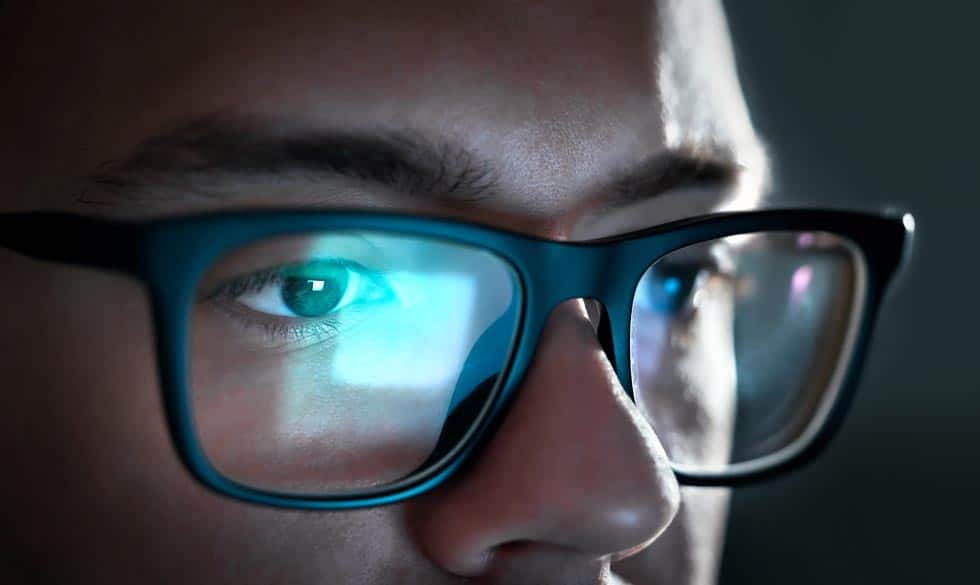In recent years, blue light glasses have become a popular tool to combat eye strain, improve sleep, and reduce the negative effects of prolonged screen time. As our lives increasingly revolve around digital devices—computers, smartphones, and tablets—these glasses have been marketed as a must-have accessory. But do they actually work, or is it just clever marketing? Let’s explore the science behind blue light glasses and their effectiveness.
What is Blue Light?
Blue light is a high-energy, short-wavelength light that is part of the visible spectrum. It is emitted naturally by the sun and artificially by digital screens, LED lights, and fluorescent lighting.
While natural blue light plays a crucial role in regulating our sleep-wake cycle (circadian rhythm) and boosting alertness during the day, prolonged exposure to artificial blue light—especially in the evening—has raised concerns.
Some of the main concerns associated with blue light include:
- Digital Eye Strain: Excessive screen time may cause discomfort and fatigue in the eyes.
- Sleep Disruption: Blue light can suppress melatonin production, making it harder to fall asleep.
- Potential Long-Term Effects: There is speculation about whether prolonged exposure could contribute to retinal damage, though the evidence is inconclusive.
What Are Blue Light Glasses?
Blue light glasses are designed with special coatings that filter out or block blue light emitted by digital devices. The goal is to reduce the impact of blue light on your eyes and overall well-being. These glasses are marketed to:
- Reduce digital eye strain.
- Improve sleep quality.
- Protect against potential long-term damage to the eyes.
The Science Behind Blue Light Glasses
1. Digital Eye Strain
Claim: Blue light glasses reduce digital eye strain caused by prolonged screen use.
Science: Digital eye strain, also known as computer vision syndrome, is real and can result in symptoms such as dry eyes, headaches, and blurry vision. However, research suggests that the discomfort is more likely caused by staring at screens for extended periods, poor posture, and reduced blinking—not blue light itself.
Blue light glasses might not directly reduce digital eye strain, but they can help by reducing glare and improving contrast on screens, which may provide some relief.
2. Sleep Improvement
Claim: Blue light glasses improve sleep by blocking the blue light that disrupts melatonin production.
Science: Studies have shown that blue light exposure in the evening can suppress melatonin production, a hormone that helps regulate sleep. Wearing blue light glasses in the hours before bedtime can potentially mitigate this effect, helping improve sleep quality.
A 2019 study found that participants who wore blue light-blocking glasses in the evening had better sleep quality and longer sleep duration compared to those who didn’t wear them. However, alternative methods, such as reducing screen time before bed or using night mode on devices, may be equally effective.
3. Protection Against Retinal Damage
Claim: Blue light glasses protect the eyes from long-term retinal damage.
Science: There is currently no conclusive evidence that blue light from screens causes permanent eye damage. Most of the concerns about blue light’s harmful effects stem from laboratory studies using very high-intensity light, which doesn’t reflect typical screen usage.
The amount of blue light emitted by screens is significantly lower than the amount emitted by the sun, and it’s unlikely to pose a significant threat to retinal health under normal conditions.
When Do Blue Light Glasses Help?
While the science doesn’t fully support all the claims made by manufacturers, blue light glasses can still be useful in certain situations:
- For Evening Screen Use: If you spend a lot of time on screens before bed, blue light glasses may help improve your sleep by reducing melatonin suppression.
- For Enhanced Comfort: Blue light glasses with anti-reflective coatings can help reduce glare and make screen time more comfortable.
Alternatives to Blue Light Glasses
If you’re not ready to invest in blue light glasses, there are other ways to protect your eyes and improve your sleep:
- Follow the 20-20-20 Rule: Every 20 minutes, look at something 20 feet away for at least 20 seconds.
- Use Screen Filters: Most devices have built-in “night mode” or “blue light filter” settings that reduce blue light emission.
- Adjust Screen Settings: Lower the brightness or increase the contrast of your screen to reduce strain.
- Limit Screen Time Before Bed: Avoid using digital devices at least an hour before bedtime.
- Practice Good Ergonomics: Maintain proper posture, keep screens at eye level, and ensure adequate lighting in your workspace.
Do You Need Blue Light Glasses?
The answer depends on your personal needs and habits. If you find that blue light glasses help reduce discomfort during screen time or improve your sleep, they may be worth the investment. However, if you’re looking for long-term protection against eye damage or a guaranteed cure for digital eye strain, the evidence doesn’t strongly support these claims.
Final Thoughts
Blue light glasses are not a one-size-fits-all solution, but they can provide some benefits for certain individuals, especially those who spend long hours in front of screens or struggle with sleep disruptions. Combining blue light glasses with healthy screen habits and proper eye care practices will give you the best chance of protecting your vision and improving your overall well-being.
As the science evolves, more definitive answers may emerge. For now, it’s important to stay informed, make educated decisions, and consult with an eye care professional to find what works best for you.
Book a home test today
Fill in the form to request a home eye test, and one of our team will be in touch
If you have any questions, please call us on
Our other blogs
